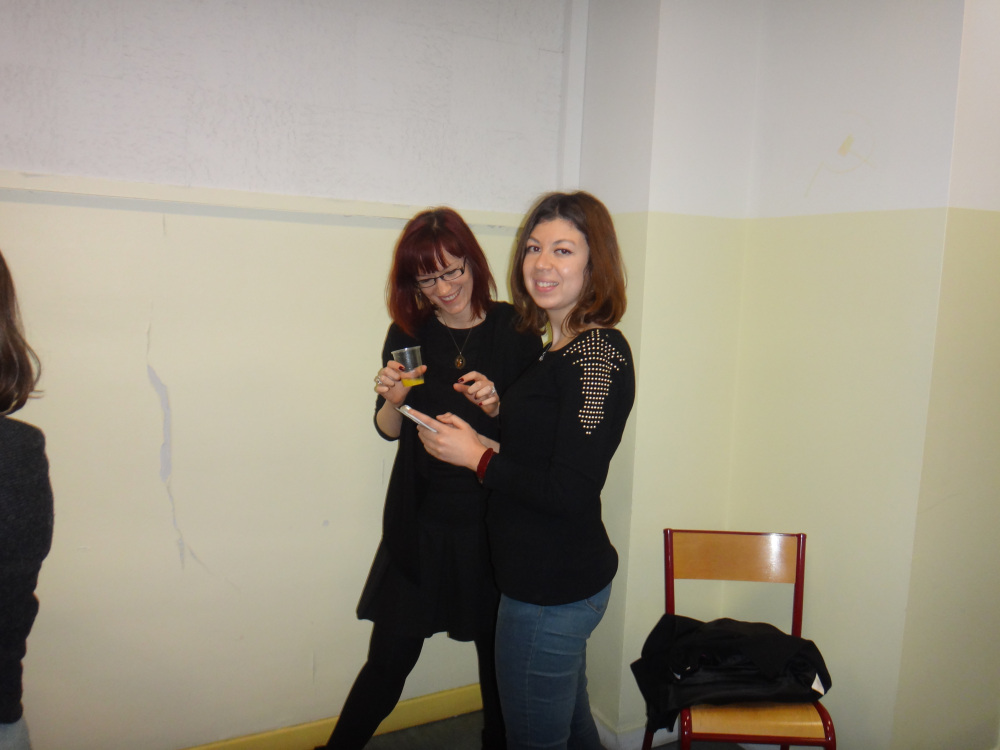Les Doctoriales permettent aux doctorants d'identifier et de travailler sur leurs compétences transverses, acquises au cours de leur cursus, et pouvant être largement sollicitées pour occuper un emploi en dehors du secteur académique.
Afin d’animer et d’améliorer le cadre de travail des doctorants, IDEA organise des rencontres annuelles et ponctuelles de ses doctorants, auxquelles sont conviées tous les autres membres de l’équipe afin d’échanger de façon constructive et informelle sur leurs travaux de recherche. Ces rencontres permettent également aux doctorants d’être intégrés dans l’équipe dès leur arrivée, de mieux se connaître, et de maintenir des contacts réguliers tout au long de l’année. C’est également une façon pour l’ensemble de l’équipe de se tenir informée des différents projets de thèse en cours.
-
IDEA Doctoriales 2024
-
Le 30 mai dernier se sont tenues les doctoriales du Congrès de la SAES, co-organisées par Sonia Awan, Sophie Tassan, Angélina Giret (Bureau du Collège des Doctorants de la SAES) et Eleanor Parkin-Coates, Ludovic Dias, Roza Djedi, Manon Küffer, Aude Martin, Pauline Schwaller et Marine Soubeille (IDEA). Interrogeant les notions de « frontières » et de « déplacements » les problématiques du 63ième Congrès ont fortement résonné avec les travaux des jeunes chercheurs, forcément confrontés à ces dernières dès le début de leurs recherches.
Quelles sont les limites du sujet (géographiques, bornes chronologiques, portée disciplinaire) ? Comment placer sa recherche dans la littérature existante de son domaine ? Un pas de côté (un déplacement) n’est-il pas nécessaire pour réactualiser une recherche préexistante ? Autant de questions sur lesquelles les six doctorants communicants et de nombreux participants ont réfléchi à l’aune de thèmes profondément ancrés dans l’actualité tels que le culte de l’Auteur, l’écologie, le féminisme mais aussi la religion.
Aussi, cette rencontre a, une nouvelle fois, démontré la diversité et l’interdisciplinarité des recherches en anglistique, soulignant l’importance de ces thèmes dans les débats académiques contemporains mais également de ces rencontres académiques comme plateforme d’expression et de discussion bienveillante pour les jeunes chercheurs.
Compte-rendu rédigé par Manon KÜFFER
-
IDEA Doctoriales 2022
-
“How to write and publish research papers - with reference to (discourse) pragmatics” (9-03-2022)
Abstract : « This (interactive) seminar discusses current policies and practices in publishing research papers internationally, focusing on different kinds of outlets: international journals, but also peer-reviewed monographs and edited volumes on special themes, and conference proceedings.
It addresses questions regarding the publication process in general and provides more details on particular issues, such as what counts as a research paper in the Anglo-American context and how do I write such a paper, what are the general expectations of editors, reviewers and publishers, what do researchers need to consider when submitting their papers and what is a double-blind reviewing process. The expectations of reviewers and editors are illustrated with some close reading of anonymized excerpts for acceptances and rejections, and the outline of research papers on discourse pragmatics ».
Les Doctoriales d’IDEA ont eu lieu le mercredi 9 mars 2022 à Nancy en présence d’Anita Fetzer de l’Université d’Augsbourg. En bi-modal, elle a explicité aux participant.e.s les différents processus anglo-américains et internationaux de publication, nommés peer-reviews ; qu’ils concernent des revues scientifiques, des monographies, des volumes ou des textes de conférences.
En effet, les éditeurs ont des attentes spécifiques que les chercheurs se doivent de prendre en compte quand ils entendent soumettre un papier en vue d’une publication. À partir d’exemples d’acceptations et de rejets, l’intervenante a ainsi expliqué en détails le procédé de relecture en double aveugle, soit le double-blind reviewing.
Compte-rendu rédigé par Marine DEREGNONCOURT
-
IDEA Doctoriales 2021
-
Dans la lignée des doctoriales 2018 qui avaient été consacrées aux problématiques liées aux corpus de recherches et avaient donné lieu à de fructueux échanges, c’est de nouveau la proposition d’une thématique méthodologique qui a été retenue pour ce rendez-vous automnal 2021 organisé par Manon Kuffer. Ainsi, après plusieurs mois ponctués de rencontres en distanciel du fait de la crise sanitaire, les doctorants et doctorantes d’IDEA ont eu le plaisir d’échanger de nouveau en présentiel autour de la thématique : « Sélectionner et organiser ses documents et données ». Cette dernière se proposait de s’intéresser aux différentes volontés et besoins de classement, tant pratiques que théoriques, du jeune chercheur.
Si Michael Paduano (doctorant 2A en littérature américaine), actuellement en voyage de recherches en archives aux États-Unis, a partagé les difficultés pratiques du dépouillement, Estelle Jardon, également doctorante (3A) en littérature, spécialisée dans le roman noir américain, a développé une réflexion critique sur la problématique du classement inhérente aux « genres populaires ». Elle est tout d’abord revenue sur l’ambiguïté quant au sens de l’adjectif populaire (par ? pour ? sur ? le peuple). Dans sa présentation intitulée « ‘Penser/Classer’ : les difficultés méthodologiques et critiques des ‘genres populaires’ », elle a questionné la logique de subordination du roman policier par rapport à la « littérature » qui mine la critique universitaire, aussi bien américaine que française, et oblige encore le chercheur à justifier la légitimité de son objet d’études.
En direct de Los Angeles, Michael Paduano a poursuivi la discussion, avec une communication intitulée « Planning and Performing Archival Research: Henry Miller, A Case Study ». Il y a décrit les conditions de son travail de compilation des lettres et manuscrits de l’auteur américain Henry Miller (1891-1980). La sélection, l’identification et l’organisation des documents et des données collectés constituent des impératifs catégoriques à leur bonne exploitation future. En ce sens, les outils que nous offrent aujourd’hui la technologie, comme le logiciel de gestion de photos Tropy, constituent une aide matérielle précieuse digne d’un assistant de recherche pour le travail en archives. Michael a également souligné à quel point cette recherche en terrain spécialisé lui permettait de vivre une expérience des plus enrichissantes, ponctuées de surprises et de défis, de rencontres et de contraintes.
Aussi, s’il a affirmé que si la recherche archivistique est un processus très personnel dépendant du domaine de recherche, de la zone géographique concernée, des collections consultées, mais aussi des ressources financières à la disposition du chercheur, force est de constater que les conseils prodigués sont précieux pour tous jeunes chercheurs ou chercheurs établis, anglicistes ou non.
Ces présentations, dépassant toutes deux le cadre des études anglophones, ont été suivies de nombreux échanges interdisciplinaires avec les enseignants-chercheurs qui étaient présents et qui ont pu partager leur expérience et faire profiter les doctorants de leurs conseils et de leurs lectures. Un autre rendez-vous des doctoriales IDEA est prévu en mars 2022 autour de la présence d’Anita Fetzer, co-directrice de Florine Berthe. Celui-ci portera sur « publier lorsque l’on est doctorant.e. ».
Compte-rendu rédigé par Estelle JARDON et Manon KÜFFER
-
IDEA Doctoriales 2020
-
“Theoretical background for doctoral research”, janvier 2020
IDEA’s PhD students were invited to gather around a common matter of concern in their research. What theoretical background to abide by? What role should theory play within a PhD?
Laura Davidel, a 5th year PhD student, was invited to account for the theoretical path followed in her research.
Laura’s thesis aims to provide an analysis of Anne Rice’s vampires as liminal creatures, who struggle to find their identity between the compulsive thirst for blood and the desire to connect with the human world.
This presentation of the theoretical background used in her thesis has focused primarily on Victor Turner’s studies regarding liminality. Laura draws on Turner’s theories about the liminal stage of transformation rites – a period of in-betweenness characterized by separation from society, a disrupted temporality, and alterity. In her presentation. This perspective on liminality has enabled Laura to explore how the Ricean vampires experience their monstrosity as liminal in relation to time, space, and difference. By reading the vampires’ monstrosity through the lens of liminality, the focus shifts from otherness to sameness, from the objectified Other to the subject
who tells his/her own story.Manon Kuffer, a first year PhD student was given the role of asking a set of prepared questions to Laura. Among them, we will quote :
- How long did it take you to find and abide by a theoretical background ?
- How easy is it to let new concepts invite themelves in research that is already advanced?
- Do you try to keep within frameworks related to interdisciplinarity ?
- How can one refrain from interpreting a theory according to one’s needs?
- Is a whole chapter devoted to presenting concepts and theorical background or are they introduced gradually within the research ?
The participants were then invited to give some feedback The lecturers and professors present transfered some arguments to give advice on how to apply theory in civilisation and linguistics research.
Eva Antal, the guest professor invited by IDEA in January and February 2020, presented the doctoral studies at Eszterhazy Karoly University (Eger, Hungary) in her university’s curriculum, the institution’s demands and the role of theory in the studies.
Eva Antal spoke about the framework of doctoral studies in Hungary. Having given a short introduction on the system in the country, she highlighted the advantages and some of the disadvantages of different doctoral programmes, taking examples from her own past and present experience. Being affiliated to three doctoral schools as a supervisor and an examiner, she could elaborate on the interdisciplinary feature of several doctoral theses, showing the strong and weak points of their theoretical approaches.
In addition to raising the questions of originality and illegitimacy of students’ topics in the 21st century, she expressed her scepticism about the forced comprehensive quality of dissertations in Hungary emphasised in the requirements, namely that a list of great amount of readings, their “bibliography”, should be provided by the students well in advance in the course of their studies. The presentation was followed by a discussion with doctoral and master’s students.
The rich discussions that followed revealed that the students needed further practical information, namely about entering academia, or anything to do with the material shaping of their research.A follow-up is planned in March, when IDEA will be welcoming Marjorie Huet, a PhD student from Porstmouth, working on cultural references in literary translation.
-
IDEA Doctoriales 2019
-
Doctoriales tri-nationales, Juin 2019
En juin dernier, Diane Leblond a fait partie de la délégation messine invitée aux rencontres doctoriales trinationales organisées à Sarrebruck, entre l'Université de Lorraine, Universität des Saarlandes et University of Warsaw. Les trois jours de rencontre prévoyaient une alternance entre des ateliers de réflexion collective autour du couple générique Utopie / Dystopie et des échanges destinés à renforcer les liens entre les trois institutions. Diane a animé « à quatre mains », en collaboration avec Heike Mißler (Université de la Sarre), une journée de séminaires intitulée « Feminist Dystopias » et consacrée à l’étude de textes d’Ursula Le Guin (« The Ones Who Walk Away From Omelas »), de Margaret Atwood (The Handmaid’s Tale) et de Naomi Alderman (The Power). L’expérience sera renouvelée l’été prochain, probablement dans le cadre d’une réflexion sur le post-humain.
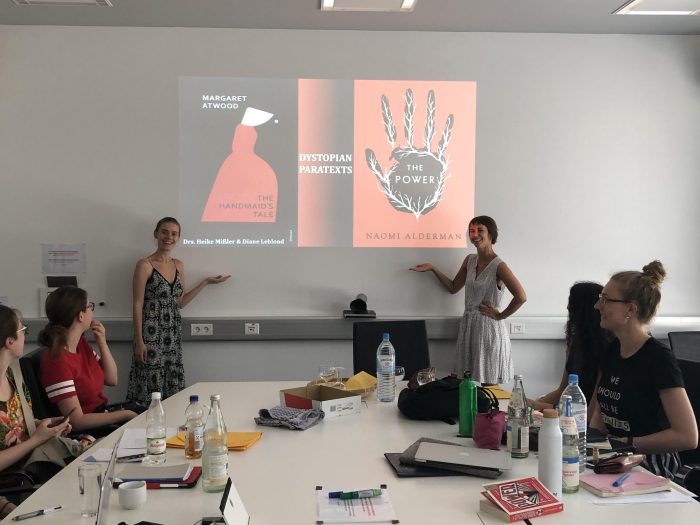
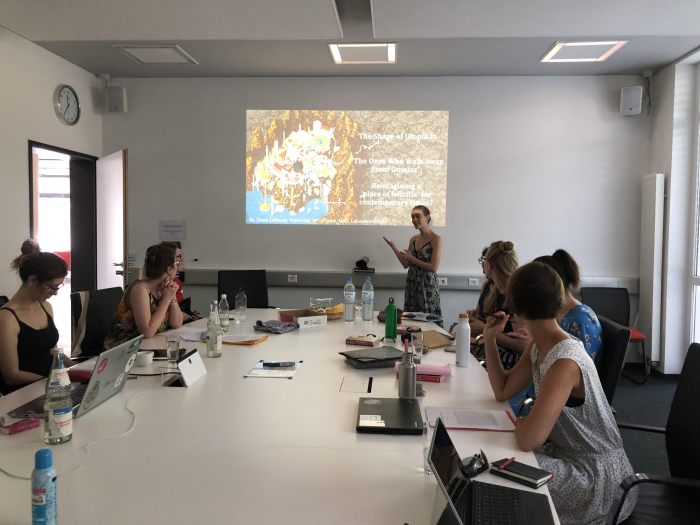
Début juillet, la rencontre annuelle d’IDEA autour de la question de l’interdisciplinarité a été une nouvelle occas ion de travailler en collaboration. En introduction de la journée, Diane a en effet proposé avec Adam Wilson une réflexion associant ses propres compétences et sa réflexion sur le champ disciplinaire des études anglophones à celles d’Adam dans le champ de la sociolinguistique et sur la question du tourisme. Un exercice interdisciplinaire destiné à penser ou à repenser l’interdisciplinarité, avec l’engouement et les réticences qu’elle suscite.
En octobre enfin, Diane est intervenue lors d’un colloque international organisé à Montpellier en partenariat entre le ESFN (European Short Fiction Network) et EMMA (Etudes Montpelliéraines du Monde Anglophone). Le colloque envisageait la façon dont la catégorie de l’ « humble » pouvait ouvrir de nouvelles voies d’appréhension générique et esthétique de la nouvelle. L’intervention de Diane (« Organic connections and creatures of compost: when humility reframes the ambition of short fiction ») considérait la pertinence épistémique de cette catégorie à travers l’analyse de deux nouvelles contemporaines d’Ali Smith et Daisy Johnson mettant en jeu un glissement paradigmatique de l’économie vers l’écologie.
Dans la continuité de nos échanges fructueux avec l’université de la Sarre, le Professeur Joachim Frenk a été reçu par Yann Tholoniat pour une conférence intitulée « Shakespeare – Adaptation – Intertextuality : Kenneth Bragh’s Much Ado about Nothing ». En accord avec le thème de l’intermédialité, thème du Master Langues et Société, parcours Recherche, sur le site de Metz, il a d’abord proposé une réflexion sur la place particulière de Shakespeare au sein des études intermédiales, avant de montrer, à un public fourni, des applications concrètes de cette réflexion à l’incipit du film de Kenneth Branagh, sorti en 1993.
Suivez la page sur les échanges avec Universität des Saarlandes.
-
IDEA Doctoriales 2018
-
11 Décembre 2018
“Le corpus : constitution, sélection, argumentation” .
Pour amorcer les échanges, deux présentations ont été prises en charge par les doctorants.
Jérôme Chemin a débuté par une présentation de son sujet de thèse et du corpus qu’il étudie. Il a choisi de centrer son analyse autour des poèmes de Coleridge et de leur apport philosophique. En effet, de nombreux critiques ont déjà abordé la richesse de l’œuvre coleridgienne sur le plan philosophique. Il se sont toutefois intéressés plus particulièrement à sa prose et ont souvent négligé le support poétique comme un moyen de penser indépendant. Sa présentation a montré la complexité de limiter un tel sujet car il est impossible de séparer l’œuvre de son contexte.
Il a ensuite souligné la difficulté d’aborder le corpus à la fois sous le prisme de la philosophie et celui de l’analyse littéraire. L’interdisciplinarité nécessite de travailler sur les très nombreux textes sources qui ont inspiré l’auteur mais aussi à appliquer deux méthodologies différentes. Il a enfin présenté les solutions qu’il a trouvées pour traiter un aussi vaste corpus. Il a décidé d’alterner entre des micro-analyses littéraires et analyses surplombantes à l’aide de logiciels tels que Voyant Tools.
Les questions des autres doctorants et des professeurs présents l’ont amené à développer l’originalité de son sujet en lien avec son exploitation du corpus mais aussi à réfléchir à son approche théorique ainsi qu’à la dimension que l’analyse informatique prendra dans sa thèse.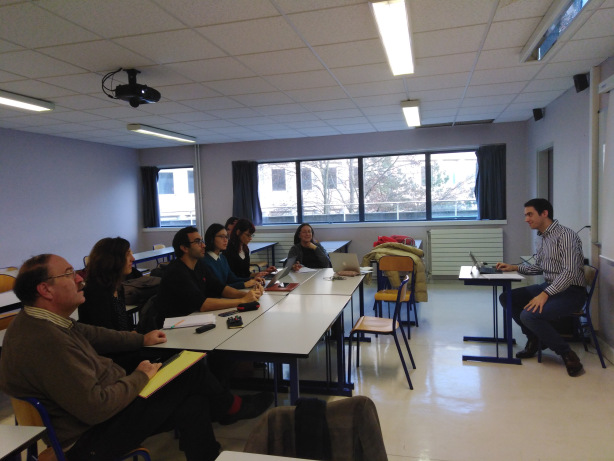
Florine Berthe se proposait de traiter de la question du corpus en linguistique et plus particulièrement dans les travaux portant sur de l’anglais oral. A travers cette présentation elle souhaitait montrer que le choix du corpus et le choix du sujet de recherche vont de pair. Loin de s’agir d’un choix statique effectué à un moment donné, le choix du sujet et l’élaboration du corpus relèvent d’un processus dynamique dans lequel l’un va influencer l’autre.
Le propos était structuré en trois temps. Dans un premier temps elle a vu de quelle manière son sujet de recherche a influencé son corpus. Plus particulièrement elle s’est intéressée aux besoins auxquels son corpus devait répondre et aux contraintes que peut représenter le fait de travailler sur de l’anglais oral. Dans un second temps, elle a confronté ses besoins aux corpus déjà existants. Il n’existe actuellement pas de corpus répondant parfaitement à ses besoins et elle a présenté alors les pistes à sa disposition suivies pour répondre au mieux à notre sujet de recherche. Enfin, sa dernière partie était davantage réflexive. Elle a porté un regard rétrospectif à la fois sur l’évolution de son corpus et de son sujet de recherche et a débattu du lien entre les deux.
Les débats ont porté sur l’importance donnée au corpus dans la chronologie du travail et sur la place physique dans le volume rédigé (annexes, amorce de la rédaction). Se sont posées des questions de contexte, d’envergure, de pertinence sans omettre les contre-exemples et leur usage.
Plusieurs doctorants ont apporté leur témoignage à l’issue de la rencontre :
It was very interesting to understand the logic underlying the development of my colleagues’ corpus. It seems that the question of thematic and chronological preference is primarily related to the different narrative genres treated by each one of us, especially with regards to the concrete differences between fiction and non-fiction. Furthermore, it was very useful to note the various ways in which the very concept of “pertinence” is understood by each researcher and how the choice of the corpus both depends on and reflects this understanding. Finally, I was glad that the question of the size of the corpus was introduced into the discussion. As an issue that I’m currently confronting, I was somewhat relieved to hear that some of my colleagues had faced the same issue at earlier stages and it was very beneficial to me to learn the approach which they adopted when addressing this issue, especially in terms of creating a balance between corpus size and their chosen methodologies, all in workable time frame.Talal HawsharThe discussion on how to approach a corpus was very stimulating. As in previous editions, the Doctoriales foster constructive feedback and idea sharing that challenge us to consider different angles in our research. This meeting also gave me the opportunity to find out more about my colleagues’ means of exploiting their corpora, especially in terms of software they use for analyzing and presenting their data.Laura DavidelLes doctorants ont manifesté leur intérêt pour d’autres thèmes sur lesquels les prochaines doctoriales d’IDEA pourront porter, à savoir l’ancrage théorique, la mise en système des données, la pertinence de l’analyse sans oublier un questionnement sur l’impact de leurs recherches. -
IDEA Doctoriales 2017
-
24 November 2017
In lieu of IDEA’s traditional “Rencontres des doctorants” for this semester, a half-day Doctoriale was organized in which several of IDEA’s doctoral students presented their research in progress, and three visiting doctoral students discussed their PhD theses within the context of three different countries: Portugal, Brazil and Algeria.
What’s New with the Doctoral Program in France?
John S. Bak opened the Doctoriale by explaining the recent changes to the PhD program in France (effective 1 Sept. 2016). Some of the changes made were significant enough to inform students and directors alike. Since several Master’s students attended (and a couple of Licence students as well), it was good for them to see what awaited them if they choose to pursue a doctorate.
One of the most significant changes made was the Minister’s demand that PhD theses in France be completed in three years. Gone are the days of seven-year PhDs, which has several implications for students and director’s alike. The first implication is that the PhD thesis is now generally shorter, with the average thesis running around 300 to 350 pages. The second implication is that hiring committees for MCFs need to recognize these changes so as not to sanction potential candidates because their theses are not 500 pages.
Another significant change, which IDEA implemented last year, was the addition of a comité de suivi for each PhD student entering their third year of study. Without this committee’s advice, the student cannot enroll. These committees, it has been clearly stated, are not “scientific” in nature. They have been put in place to catch any problems the doctoral student might be having which could impede the completion of the thesis. These committees must meet each subsequent year beyond the third enrollment and submit a short report to the Ecole Doctorale.
There are numerous other changes, some significant enough worth mentioning briefly: a director can sit on a student’s jury but no longer has a vote in the final assessment); a student has the right to declare their studies full or part-time (part-time PhDs can last for five years); a student can take a one-year leave of absence during their studies, but only one year; the jury needs to have gender parity; any doctoral student can request to teach classes within his or her department; etc.
John Bak encouraged students and directors and future directors alike to read the Minister’s report before taking on a new PhD student.
Roundtable 1: Research Presentations by IDEA’s Doctoral Students
The first roundtable included four of IDEA’s current PhD students: Steven Paschall (5th year), Gaëlle Lafarge (3rd year), Laura Davidel (4th year), and Florine Berthe (1st year). Steven, who is nearing his defense, spoke about his latest work on American poet Susan Howe. Gaëlle explained her narratological reading of two 19th-century travelogues along the Mississippi River. Laura discussed her application of Judith Butler’s performative queer theory to Anne Rice’s vampire chronicles. And Florine presented her PhD project on the thématisation en anglais oral spontané.
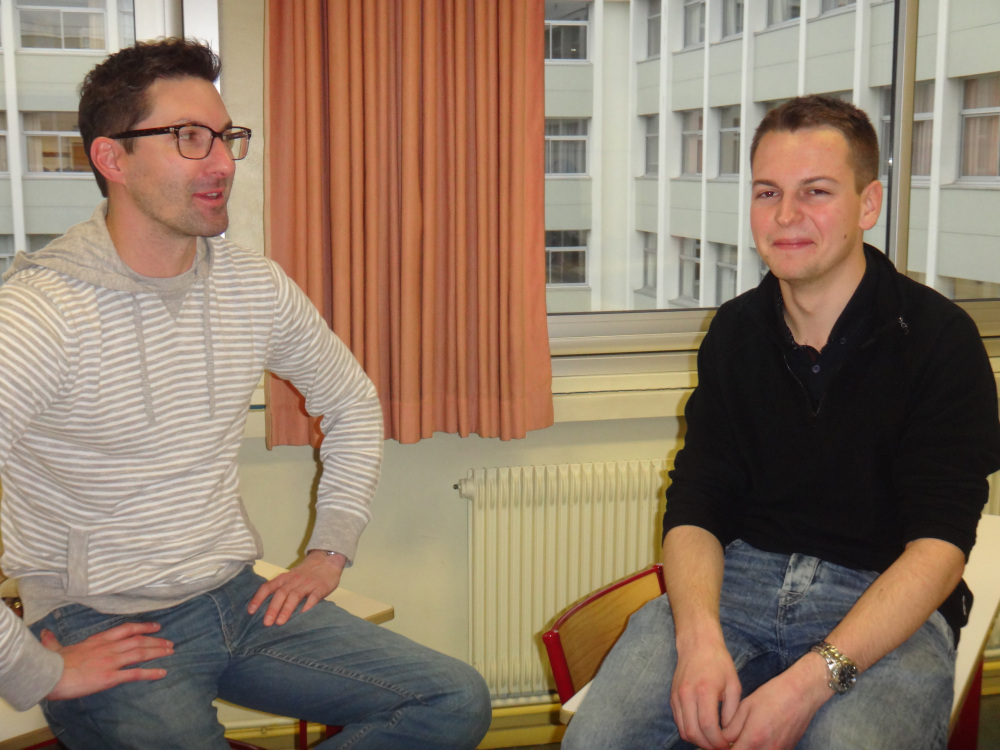
Roundtable 2: Research Presentations by IDEA’s Invited Doctoral Students
The second roundtable included research presentations by three visiting PhD students, who are working with IDEA professors. Lilian Juliana Martins, from the Journalism Department of the Universidade Estadual Paulista Júlio de Mesquita Filho (Brazil), presented her thesis on a Brazil literary journalist, Antônio Callado. Manuel João de Carvalho Coutinho, also from the Journalism Department of the Universidade Nova de Lisboa (Portugal), discussed the process of completing a PhD in Portugal and explained how his thesis is attempting to problematize the history of literary journalism in his country. And Aziza TaharDjebbar, from the Centre Universitaire de Relizane (Algeria), explained her work on the American welfare system.
Comparative PhD programs (France, Algeria, Portugal, Brazil, U.S., U.K.)
After a brief coffee break, the three visiting PhDs gathered again, but this time to discuss the process of undertaking a PhD in their country. Aziza explained the procedure from inscription to defense in Algeria; Lilian did the same for Brazil, adding that students must take several seminars and pass a mid-term defense of their thesis in order to proceed to the final stages of the PhD; and Manuel added a few more details about the PhD in Portugal. John Bak discussed the process of a taking a PhD degree in the United States, which includes two years of advanced seminars, qualifying exams, and the dissertation, usually written in the last two years of the four-year program. Antonella Braida completed the discussion by detailing the PhD degree in the United Kingdom. The discussion elicted several questions from all the students in attendance.
Group work: What are the Roles of the PhD Director?
The final session (inspired from a similar session conducted by Alberto Lázaro, Director de la Escuela de Doctorado at the Universidad de Alcalá) was dedicated to the perceived roles of a PhD director viz. his or her PhD candidate. The goal was not to be prescriptive but to open up dialogue between the degree candidates (at all levels) and the directors about what each perceives to be the most important “traits” in a director. John Bak served as moderator/animator of what was an exciting and enlightening debate
First, he distributed a sheet of paper containing 25 items pertaining to the various tasks asked of a PhD director. Each of these tasks was vital, from being a seasoned researcher him or herself, to motivating the student when thesis was not progressing well; from helping the student to publish or find fellowships, to informing them of possible job opportunities outside of academia, etc. He then informed everyone that the goal of the exercise was to discuss and 3 debate each item and choose only 5 among the 25 items listed, and then rank them in order from first to fifth in terms of importance.
Next, he divided everyone into several small groups. There was a group of PhD directors, another of IDEA’s PhD student, a third group of the visiting PhD students, and a final group of Master’s and Licence students (although they have not yet worked with a PhD director, each has worked with a research director and thus had formulated ideals and goals along the way). The groups debated amongst themselves for the better part of half an hour. The task was not easy, since the group had to agree on the five, ranked items, which was not easy, since 5th- and 1st-year PhD students obviously do not have the same perspective; nor do foreign students, whose own programs are vastly different, or undergraduate and Master’s students, for that matter.
Once the groups completed their lists, John Bak then began asking each group to list their first choice. Not surprisingly, none of the groups had the same item listed as their first choice (only a few items in total were on each of the groups’ lists).
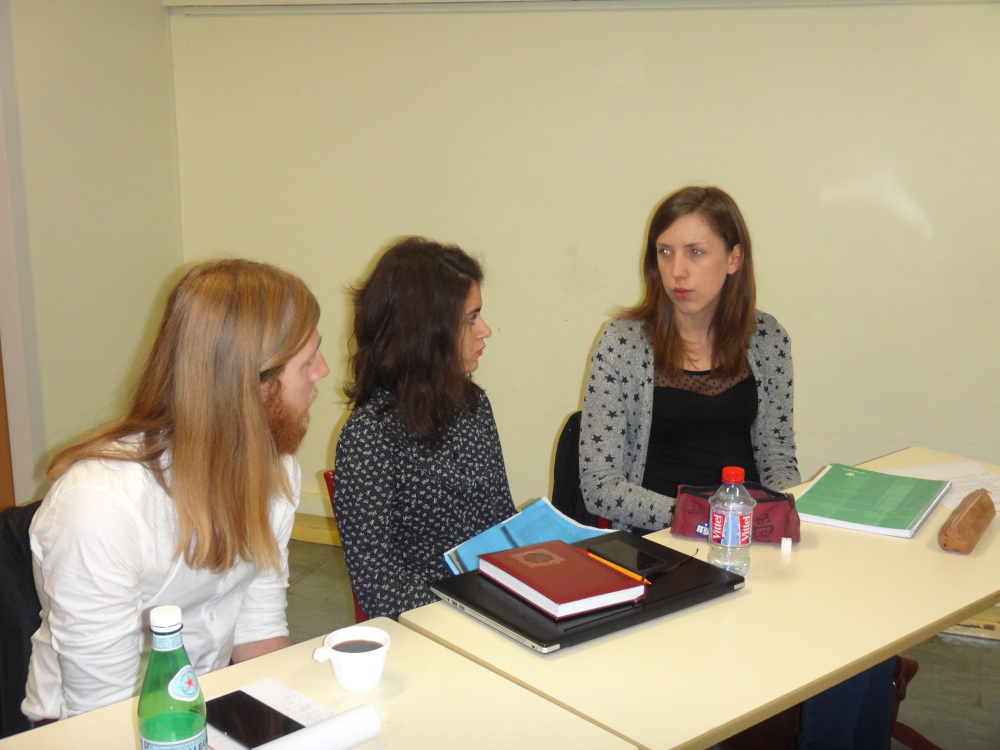
The directors, for instance, had listed “be a good research” as their first choice for a director, whereas the visiting PhD students had chosen “consider the student’s point of view” as their first item. The under/graduate students, who did an excellent job, argued that the director should first and foremost inform the student when their work is good and when it is bad. The senior PhDs obviously had different concerns: they wanted their directors to push them to publish, advice them of available financial resources, and present them with job opportunities after the PhD defense.
If “tags” could be given to each group according to their list of choices, the directors were “editors” (give care to the thesis as much as to the student); the senior PhD students needed “encouragements”; the visiting PhDs wanted directors who were “caring”; and the under/grad students said “push us”.
A lot of laughs were shared during the final session, which was really both fun and enlightening for all who participated. The visiting students all agreed that they wish they had had events such as this at their home universities.
The evening ended, as the “Rencontres” always do, with an amiable reception, where students and directors alike shared conversation over a glass of wine.
